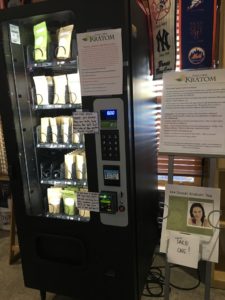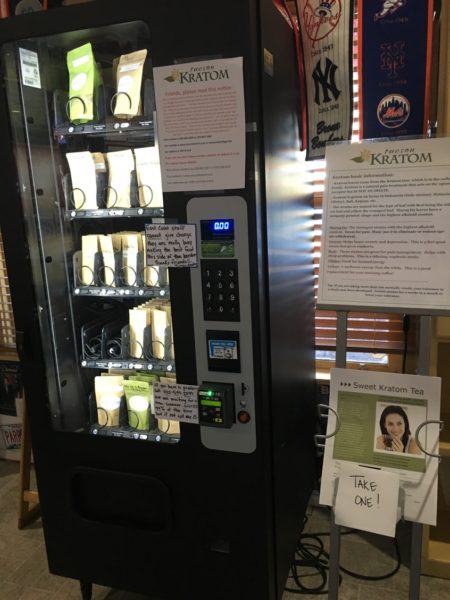By LIZ O’CONNELL
Arizona Sonora News
Not everyone who comes into East Coast Subs is there to order a sandwich. Some customers at the small restaurant south of the University of Arizona campus go straight to the vending machine in the dining room, and pull out their wallets.
The machine dispenses 100, 40 and 10 gram packages of kratom, a substance derived from the leaves of a tropical tree found in Southeast Asia and highly valued for what some say is its near opiod-like ability to relieve pain, depression and anxiety.
Just like any vending machine, customers swipe a card or put $5 to $25 in cash, make their choice and out tumbles a bag of kratom. It is that simple.
But it is not so simple to the people at the U.S. Drug Enforcement Agency. They argue the substance’s narcotic-like effects on the body means it should be as a controlled substance, same as prescription painkillers.
“A lot of people say kratom treats them for any type of chronic pain, opioid addiction and stomach problems related to menstrual cycles, that’s what has been alleged,” said Melvin Patterson, a DEA spokesman. “We at the DEA say it has opioid-like effects on the body.”
The DEA had intended to enforce a ban on sale and distribution of kratom at the end of September. That would have meant the end of the vending machine in East Coast Subs, because agents would argue it was dispensing an illegal drug.
But in the face of opposition from defenders of kratom – including several members of U.S. Congress – the DEA agreed to postpone any final decision on kratom pending further review. The DEA has opened a period of public comments until Dec 1.
Defenders argue that kratom is a safe and natural alternative to opiod-based painkillers, and therefore should not be banned.
Several members of Congress, including U.S. Rep. Matt Salmon of Arizona, wrote to the DEA, and asked that the ban on kratom be delayed. They said they understood the DEA’s desire to uphold public health and safety, and want to keep unsafe products off the market. But they argued that the majority of thepublic believes kratom is a safe alternative to prescription opioids.
According to the DEA, kratom is distributed in multiple forms: powder, plant, capsules, tablets, liquids, gum and drug patches. Due to the different forms of kratom, the DEA said purity levels and the quantity of these substances are inconsistent and therefore it poses a significant health risk to users.
The DEA’s decision to put off the ban has given the vending machine at East Coast Subs a second lease on life.
Alongside the small black vending machine are flyers explaining kratom, how to use it in teas and recommendations of which flavor a customer should buy based on his or her symptoms.
A website for Tucson Kratom, the company that runs the vending machine, lists all the exotic names for the different strains of kratom. The names are related to the type of leaf used to make kratom. A red leaf is the oldest and yellow is the youngest.
According to the Tucson Kratom website, the Maeng Da blends are the company’s signature seller. It is the strongest strain of kratom. The Tucson Kratom website even suggest a particular strain of kratom called Maeng Da to help reduce opiate addiction.
Kratom is commonly distributed through internet sales, or in some retail shops. The vending machine in East Coast Subs is believed to be the only kratom dispenser in the Tucson area.
Keith McNesby, the owner of East Coast Subs, opened the restaurant near the University of Arizona campus 19 years ago, filling it with sports memorabilia from the East Coast and Arizona. McNesby said he agreed to put in the vending machine six months ago, when he was approached by Anna Caffarel, a friend who operates Tucson Kratom.
“I see a lot of hurting people that are coming in here to buy this stuff,” McNesby said. But if the DEA ban goes into effect, McNesby says the machine will “out the door in about 22 seconds.”
##




